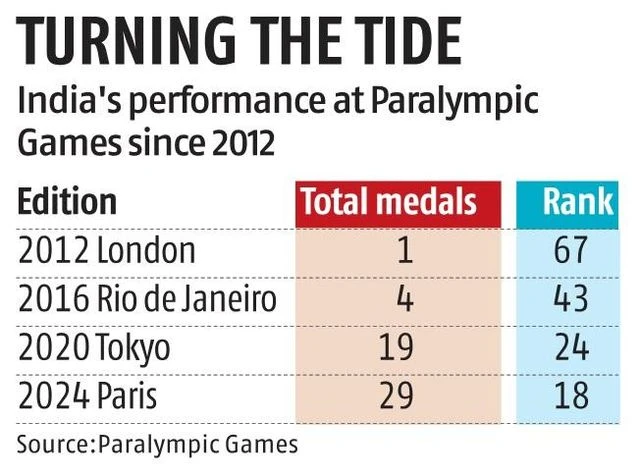India’s Paralympians achieved a remarkable milestone in Paris, winning 29 medals and surpassing their previous record of 19 in Tokyo. While their success has brought them recognition, support from brands and corporations remains limited. Para-athletes like Rubina Francis and Mona Agarwal emphasize the need for early support and funding, particularly for grassroots programs. Although government initiatives like Khelo India are beneficial, athletes believe that corporate backing for training, equipment, and long-term security can significantly enhance their chances. With increased visibility and interest following their strong performances, there is hope for more meaningful partnerships in the future, allowing these athletes to thrive.
India’s Paralympians celebrated a remarkable achievement at the recent Paris Games, bringing home a stunning 29 medals – an increase from the 19 medals earned at the Tokyo Games three years ago. This impressive performance has not only highlighted the talent and hard work of these athletes but has also drawn attention to the need for greater financial support from brands and corporations.
Rubina Francis, who won a bronze medal in pistol shooting, expressed her pride in being an Olympian, stating, “We are Olympic winners, feeling like a celebrity.” She noted improvements in facilities and funding but emphasized that there is still more work to be done. Mona Agarwal, another standout shooter and a beneficiary of the Khelo India scheme, highlighted the importance of early support for budding athletes, stressing that grassroots assistance is crucial for future success.
While there is recognition of the athletes’ efforts from the government and non-government organizations like Olympic Gold Quest, para-athletes share concerns about the significant gap in brand endorsements compared to able-bodied athletes. Avani Lekhara, who made history by winning two medals, said more visibility and long-term endorsement deals are needed.
Despite growing organic interest from brands due to their achievements, individual sponsorships remain limited. Neerav Tomar, a sports agent, pointed out that most discussions revolve around short-term collaborations rather than long-term endorsement deals. Experts agree that additional funding is essential for para-sports, considering the specialized equipment and training required.
As para-athletes enjoy a surge of media coverage and public interest compared to previous years, they remain hopeful for future opportunities. The shift in perception following the Tokyo Olympics has opened doors for more meaningful partnerships, allowing these exceptional athletes to shine on the global stage. As they bask in this newfound glory, there is optimism that ongoing support and sponsorship will continue to grow.
Tags: Paralympics, Indian Sports, Para-athletes, Paris Games, Sponsorship, Khelo India, Athlete Support, Brand Endorsements, Avani Lekhara, Rubina Francis.
-
What is making Paralympians in India successful?
Paralympians in India are achieving great success because of their hard work, dedication, and support from coaches and sports organizations. -
Why is India Inc’s support important for Paralympians?
Support from Indian companies can provide financial help, training facilities, and better resources, which can help Paralympians perform even better. -
What challenges do Paralympians face in India?
Paralympians often face challenges like lack of funding, limited visibility for their sports, and inadequate training facilities. -
How can people help Paralympians in India?
People can help by spreading awareness, supporting events, and encouraging companies to invest in Paralympic sports. - What are the future goals for Indian Paralympians?
The future goals include winning more medals in international competitions, improving training resources, and inspiring more people with disabilities to participate in sports.
)





